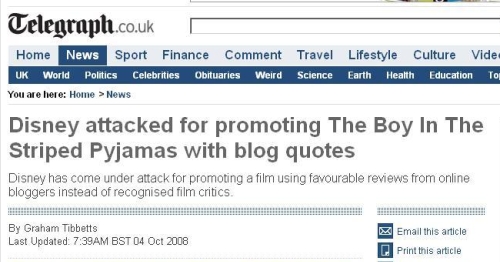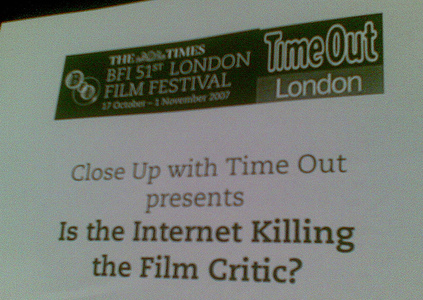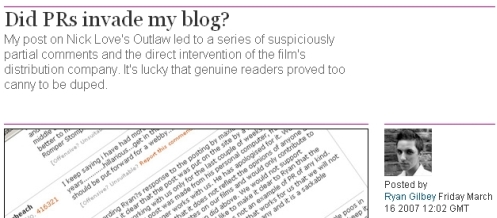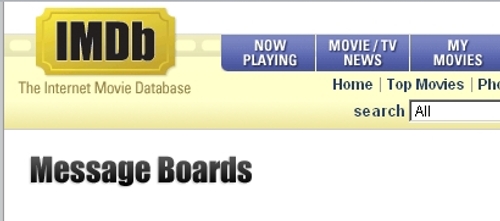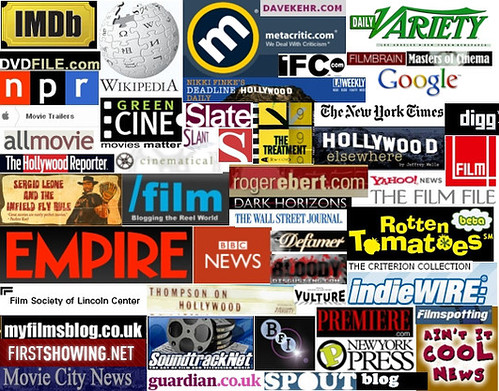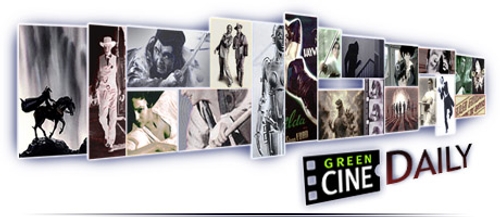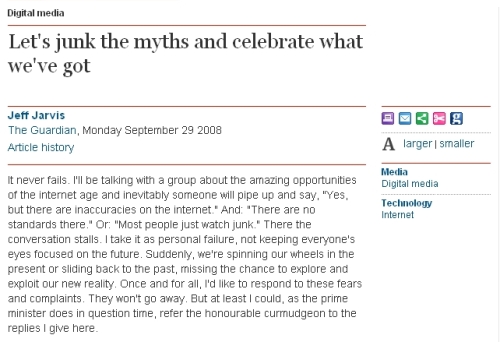The Telegraph today are reporting that Disney are using quotes from IMDb message boards on posters for The Boy in the Striped Pyjamas.
Graham Tibbetts writes:
Advertisements in Britain for The Boy In The Striped Pyjamas quoted seven phrases taken from reviews on the film fans’ website IMDb.com (the Internet Movie Database).
The praise included “Simply stunning” from a blogger called Theedge-4, and “Please please see this film”, written by Mjavfc1.
Apparently, the quotes were used in newspaper and online adverts.
It strikes me as a little odd that Disney’s UK marketing team would go down this route, given that the film got mostly good reviews anyway from ‘established’ critics.
Are they are somehow trying to appeal to a younger viewer who doesn’t read newspapers or magazines and gets their reviews online?
Later in the piece, Disney UK’s executive marketing director explains their aims:
Having used many of the critics’ quotes on all pre-release ads and also for a further two weeks in-season, we felt that it would provide a welcome change for readers if we were to freshen up the campaign and, crucially, demonstrate that the film now has the support of the public and the critics,” he said.
“The key point to make is that the bloggers’ reviews were always to be used in addition to – and never ‘instead of” – those of the film critics.”
Mr Jury added: “The recognised film critics are, and will continue to be, one of the mainstays of the industry from both a marketing and publicity point of view.”
I’m still not sure this was a great strategy and I think they have confused ‘bloggers‘, as I understand the term, with IMDb users.
However, I remember at a London Film Festival panel last year entitled Is The Internet Killing the Film Critic?, one member enthused that her favourite place to read reviews was indeed the IMDb message boards (was a Disney marketing exec listening that night?).
But to quote usernames like ‘Mjavfc1’ and ‘Theedge-4’ on a poster for a serious film like The Boy in the Striped Pyjamas seems a little bit odd.
The Telegraph does also bring up some interesting issues though, as it reports on why this kind of marketing might be damaging to ‘traditional’ film criticism:
…the practice, used in newspaper and online marketing of the picture, has been condemned by professional critics.
Jason Solomons, chairman of the film section of The Critics’ Circle, said: “These online postings are unreliable. We don’t know who the writers are.
Anybody can make up an internet name – it could be the producer himself or one of the actors.
“It’s a very dangerous area because the anonymity gives them complete freedom to express themselves without being accountable for what they have written. It’s actually cowardly and I don’t think it’s helpful to use them.”
I actually have a lot of sympathy with what Jason is saying here, as I generally believe that openness and transparency are very important for online readers and writers.
Apart from exceptional circumstances when anonymity needs to be used for the greater good, such as whistle-blowers or those blogging in repressive regimes, saying who you are is important as it encourages a better and more honest debate.
Also, anyone familiar with the episode of when an anonymous employee at Vertigo films started posting anonymously on The Guardian’s film blog about Outlaw will know that anonymity online isn’t as anonymous as some might think.
But back to the Telegraph story:
Although many critics applauded the film, none of their reviews were quoted in the newspaper advertisement.
I’m guessing that this was because this particular part of the ad campaign was meant to appeal to a more online-savvy audience, whatever the merits of that.
But it goes on:
The situation contrasts with Mama Mia [sic], which was released to critical derision earlier this year but flourished after reviews by the public.
I think ‘reviews by the public’ means good old traditional word of mouth doesn’t it? Or are they talking about those TV spots that include interviews with audience members enthusing about a film outside a cinema?
Whatever the case, Mamma Mia! was essentially critic proof and didn’t just ‘flourish’ because of ‘reviews by the public’ – it’s record breaking gross was mainly down to the fact that it was based on a hugely successful musical featuring songs from one of the biggest music acts of all time.
But now the wheels really start to come off this article:
Mr Solomons, who writes for a number of national newspapers and was among those who praised The Boy In The Striped Pyjamas, said: “This is a very important film and it’s a shame to see it cheapened in this way, especially when it had decent reviews.”
He said that some of his colleagues believed the use of blogging reviews threatened their future.
“There is a fear that it could spell the end of the critic. I’m hoping that it will highlight the inconsistencies of the internet and reinforce the point of us. People will realise they can’t be guided by ‘Pete63’ because they don’t know who it is.”
Mr Solomons stressed the importance of the relationship between the critic and the public and said: “When a film-goer reads a critic whose views chime with theirs, they know that if the critic likes a film then they go along and enjoy it. That wouldn’t happen with a blogger they don’t know.”
Whilst Jason is expressing a legitimate point of view, the article is framed so that anonymous-bloggers-with whacky-names are positioned against the good old-fashioned print critic.
But you know something is seriously wrong when a national newspaper is using a phrase like ‘blogging reviews’. What exactly are ‘blogging reviews’?
My feeling here is that comments on IMDb message boards are being confused with people who write online in a blog format.
What is a blog format, or indeed a blog? Well, it usually (but not always) means a website, or a section of one, which contains diary style entries, links to other sites and a comments section.
But the mistake some journalists make (like Rachel Cooke of the Observer back in 2006) is that they see all ‘bloggers’ as one huge pack of anonymous amateurs writing ill-informed articles.
Whilst there is a lot of bad writing amongst the millions of blogs out there, only a total buffoon would dismiss them as one amorphous group.
After all, there are many great blogs out there publishing a lot of interesting film material on a regular basis.
What about GreenCine Daily, /Film, Hollywood Elsewhere, Awards Daily, In Contention, Spout Blog, The Hot Blog and The House Next Door?
And what about established journalists like Roger Ebert, Anne Thomspon, David Carr, Nikki Finke, Jim Emerson and Dave Kehr?
All of these are bloggers I read on a regular basis. They have different qualities and voices that I want as part of my regular film reading.
I judge them on what they write – not the technical mechanism by which their content reaches me.
Whilst I agree with Jason’s view that anonymity is (mostly) a bad thing, his view of film criticism (e.g. newspaper critic sees film, which newspaper reader then dutifully goes to see) is a little outdated.
Now, a film fan with web access – which is a lot of people – can read all sorts of interesting and well written sites about films. The trick is to sort out the good from the bad.
My contention in these – now surely dated – debates about ‘old’ and ‘new’ media is that the cream will rise to the top.
When some newspaper journalists get into these discussions they often seem like a vicar at a rave – disapproving, confused and out of place.
There is also more than a whiff of ivory-tower disdain that amateurs are storming the Bastille of professional journalism.
But is this idea of angry bloggers waving their pitchforks at mainstream media either helpful or accurate?
Surely with the sheer range of film writing out on the web, there are bound to be some lesser known bloggers who are better than well paid journalists?
What’s interesting to me is that for all of the money and resources pumped into the film sections of The Guardian and The Telegraph, a blog like GreenCine Daily is more useful than either of those.
Now I should say that I enjoy and regularly read the Guardian and Telegraph film sections – a lot of the articles they comission and publish are well written and as national newpapers they can draw upon a pool of excellent contacts and resources.
So why is a blog like Green Cine Daily superior? Because it links daily to some of the most interesting film content on the web and has a great range which takes in blockbusters like Hancock and releases like Silent Light and Vampyr. (And I’m not just saying this because they occasionally link to my stuff).
So, something does stick in the craw when established newspapers distort and misrepresent film writing on the web as anonymous amatuers who are endangering their profession.
For all the power and heavy lifting of ‘old media’ companies, there still seems to be a reluctance to really link out to the best of the web as they appear to be stuck in a world where they have to be the best at everything.
For any doubters about linking out to better content on the web, please watch this video of Jay Rosen explaining why it is important both for blogs and traditional news media:
Blogs on traditional newspapers are often not what I would call proper blogs, but rather sections where they throw out questions or allow comments on pieces commissioned for the print newspaper.
To be fair, things are improving and I salute editors like Alan Rusbridger and Will Lewis for embracing the web but that said surely the credits are beginning to roll on the age where we solely read national newspaper critics?
They still have value, especially in the case of Philip French, Peter Bradshaw, Mark Kermode and Wendy Ide – all film critics for UK national newspapers I really respect and admire.
The traditional skeptical response to this inevitable change is to say: ‘ah yes, that’s all very well but there’s a lot of rubbish on the internet’.
But my usual response to that is why aren’t you ignoring the rubbish and hunting down the good stuff? If you need some examples to get going, check out my list of useful movie websites.
For hardcore Internet skeptics I would urge you to read a recent piece by Jeff Jarvis, who blogs at BuzzMachine and writes a weekly column for the Guardian.
Entitled Let’s Junk the Myths and Celebrate What We’ve Got, it addresses and refutes many of the paranoid questions established journalists often mutter about online writing.
Good writers – I think – will always be read. What hasn’t yet been worked out, due to the technological and social changes engulfing the media, is how that will work out in the long run.
Whilst I have sympathy for journalists and news organisations who’s traditional working methods are threatened, it is vital that they and their owners engage in a positive debate about how to use the web to their advantage rather than complain about what a threat it has been.
But the final irony of the Telegraph article is this bit:
Another reviewer, who did not wish to be named, said he suspected Disney quoted the bloggers because it feared the film would receive a critical mauling.
“I don’t wish to be snobbish about them but you can find bloggers who can rave about anything,” he said.
So it seems wrong for bloggers to remain anonymous, but does the same standard apply to journalists issuing snotty comments?
It seems you can find journalists who will remain anonymous and ignorant about anything.
Your thoughts are welcome below.
> Original story at The Telegraph
> The Boy in the Striped Pyjamas at the IMDb
> Recent interviews I did with the cast, writer and director of The Boy in The Striped Pyjamas
> My LFF report last year on the debate entitled Is the Internet Killing the Film Critic?
> My list back in May of The Most Useful Movie Websites
> Michael Coniff tried to define what a blog is back in 2005
> Green Cine Daily with a podcast on a debate about the future of film criticism
> The Jeff Jarvis piece entitled Let’s Junk the Myths and Celebrate What We’ve Got
